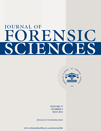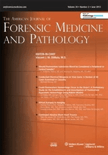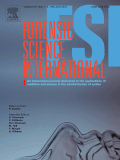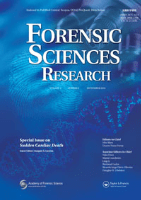
JOURNAL OF FORENSIC SCIENCES
Scope & Guideline
Introduction
Aims and Scopes
- Interdisciplinary Research:
The journal encourages studies that combine various scientific fields including biology, chemistry, physics, and anthropology to enhance forensic methodologies and practices. - Application of Advanced Technologies:
Papers often explore the use of cutting-edge technologies such as DNA analysis, imaging techniques, and machine learning algorithms in forensic investigations. - Focus on Practical Forensic Applications:
Research highlights practical applications of forensic science in law enforcement, including crime scene investigation, evidence analysis, and courtroom presentation. - Ethical and Legal Considerations:
The journal addresses the ethical implications and legal frameworks surrounding forensic practice, ensuring that scientific advancements align with judicial standards. - Public Health and Safety:
There is a consistent focus on forensic science's role in public health and safety, particularly in the context of drug-related deaths, toxicology, and environmental forensics.
Trending and Emerging
- Digital Forensics:
There is a growing emphasis on digital forensics, including the analysis of digital evidence from electronic devices, social media, and cybercrime, reflecting the increasing intersection of technology and crime. - Biomarkers and Molecular Techniques:
Research focused on the identification of biomarkers for various forensic applications, particularly in toxicology and pathology, is trending, highlighting advances in molecular biology. - Machine Learning and AI Applications:
The integration of artificial intelligence and machine learning in forensic analysis is emerging as a significant trend, offering innovative approaches to data interpretation and evidence classification. - Environmental Forensics:
Studies examining the impact of environmental factors on forensic investigations, such as the role of climate change in decomposition and the use of ecological methods for body recovery, are gaining prominence. - Forensic Anthropology and Bioarchaeology:
An increased interest in the application of anthropological techniques to historical and archaeological contexts is evident, with a focus on understanding past human behaviors and societal structures.
Declining or Waning
- Traditional Forensic Techniques:
Methods that rely heavily on traditional practices, such as basic fingerprint analysis and visual inspections, are seeing a decline as more advanced technologies and methodologies gain traction. - Single-Discipline Studies:
Research that focuses solely on one discipline, such as pure anthropology or pathology without interdisciplinary collaboration, appears to be waning in favor of more integrated approaches. - Non-Empirical Studies:
Papers that do not present empirical data or practical applications, such as theoretical discussions without experimental validation, are less frequently published.
Similar Journals

INTERNATIONAL JOURNAL OF LEGAL MEDICINE
Elevating Standards in Legal Medicine ResearchINTERNATIONAL JOURNAL OF LEGAL MEDICINE, published by SPRINGER, stands at the forefront of research in the fields of legal medicine, pathology, and forensic science. With an ISSN of 0937-9827 and an E-ISSN of 1437-1596, this esteemed journal has successfully maintained its reputation as a leading publication since its inception in 1990, providing a platform for the dissemination of cutting-edge research and case studies. The journal is recognized as a Q1 category publication in the 2023 Pathology and Forensic Medicine quartiles, ranking #44 out of 208 in its category on Scopus, reflecting its significant contribution to the academic community—demonstrated by its impressive 79th percentile. While the journal operates under a traditional subscription model, it is committed to enhancing access to critical insights in legal medicine. The INTERNATIONAL JOURNAL OF LEGAL MEDICINE invites researchers, professionals, and students to explore its manuscripts that shed light on the intersection of law and medicine, thus pushing the boundaries of what is known in these vital fields.

International Journal of Medical Toxicology and Forensic Medicine
Advancing the Frontiers of Toxicology and ForensicsInternational Journal of Medical Toxicology and Forensic Medicine, published by Shaheed Beheshti Medical University of Medical Sciences & Health Services, is a pioneering platform dedicated to advancing knowledge within the critical fields of toxicology and forensic medicine. Established as an Open Access journal since 2011, it ensures wide dissemination of research findings, catering to a global audience of researchers, healthcare professionals, and students. With an ISSN of 2251-8762 and an E-ISSN of 2251-8770, the journal covers a diverse range of topics relevant to the medical community, albeit being categorized as Q4 in both Pathology and Forensic Medicine and Toxicology in 2023, indicating emerging significance in these disciplines. Geographically based in Tehran, Iran, it aspires to bridge gaps in scientific research and practice, particularly in regions where such expertise is critical. The journal welcomes submissions that investigate pressing issues in medical toxicology and forensic science, fostering an interdisciplinary dialogue essential for innovative solutions and improved public health outcomes.

AMERICAN JOURNAL OF FORENSIC MEDICINE AND PATHOLOGY
Exploring the Intersection of Medicine and LawThe American Journal of Forensic Medicine and Pathology is a pivotal publication within the field of forensic science and pathology, dedicated to disseminating influential research and advancements in the evaluation of death and injury in legal contexts. Published by Lippincott Williams & Wilkins, this journal, which has been in circulation since 1980, serves as a vital resource for professionals, researchers, and students focused on intersecting disciplines such as medicine and forensic investigations. While it holds a respectable Q3 ranking in both the Medicine (Miscellaneous) and Pathology and Forensic Medicine categories as of 2023, the journal's impact is underscored by its contributions to the ongoing dialogue on forensic practices and methodologies. The American Journal of Forensic Medicine and Pathology provides a platform for innovative papers that shape the future of forensic science, also offering insights through case studies, reviews, and research articles that cater to its diverse readership. With an ISSN of 0195-7910 and E-ISSN 1533-404X, the journal continues to support the scholarly community in advancing knowledge within this critical field.

Forensic Science International
Transforming Evidence into InsightForensic Science International is a premier journal published by Elsevier Ireland Ltd, dedicated to advancing the field of forensic science through interdisciplinary research and scholarship. Since its inception in 1978, this esteemed journal has provided a platform for vital research, receiving recognition in the Q1 category for both Law and Pathology and Forensic Medicine as of 2023, underscoring its significant impact in these domains. It currently ranks 54th out of 1025 journals in Social Sciences - Law and 51st out of 208 in Medicine - Pathology and Forensic Medicine, placing it in the top echelons of academic journals according to Scopus metrics. Forensic Science International transitioned to Open Access in 2019, ensuring that critical findings are widely available to the global research community and enhancing collaboration among forensic professionals. With a forward-looking scope that evolves to meet the challenges and innovations of forensic science, this journal remains a pivotal resource for researchers, practitioners, and students who are committed to the continued advancement of forensic science and its applications in legal contexts.

Forensic Toxicology
Innovating the Future of Forensic Toxicology ResearchForensic Toxicology is a premier journal published by Springer, renowned for delivering cutting-edge research in the realms of toxicology, biochemistry, and forensic medicine. With an ISSN of 1860-8965 and an E-ISSN of 1860-8973, this journal has established itself as a significant resource for professionals, researchers, and students engaged in the analysis of toxic substances within a forensic context. Its impressive impact factor and ranking reveal its influential presence in the field, particularly as it is categorized in Q1 for Pathology and Forensic Medicine and Q2 for Biochemistry (Medical) and Toxicology. Featured articles span a wide array of topics, facilitating interdisciplinary collaboration and advancing scientific knowledge. While currently not an open-access journal, it remains accessible through institutional subscriptions. With a convergence span from 2006 to 2024, Forensic Toxicology is committed to publishing high-quality research that enhances the understanding of toxicological phenomena and their implications in forensic investigations, reinforcing its role as an indispensable resource in the scientific community.

Forensic Science International-Digital Investigation
Advancing the Frontiers of Digital ForensicsForensic Science International-Digital Investigation, published by Elsevier Science Ltd, stands at the forefront of multidisciplinary research in the realm of digital forensics and forensic science. With an impressive impact factor and recognition as a Q1 journal in critical categories such as Law and Medical Laboratory Technology, it has established itself as an essential resource for researchers, practitioners, and students alike. Its open access policy promotes broad dissemination of cutting-edge findings, facilitating collaboration and innovation in this ever-evolving field. Covering topics from computer science applications to forensic medicine, it addresses the complexities of digital evidence analysis in today's technology-driven world. As it converges from 2020 to 2024, the journal reflects ongoing advancements and profound challenges faced in forensic investigations, making it a vital platform for sharing knowledge and fostering scholarly dialogue.

Forensic Sciences Research
Empowering Forensic Innovation Through Open AccessForensic Sciences Research is a distinguished open-access journal published by Oxford University Press, dedicated to the interdisciplinary field of forensic sciences. Since its inception in 2016, the journal has rapidly established itself as a vital resource for researchers, professionals, and students in areas including analytical chemistry, anthropology, biochemistry, genetic studies, and various branches of forensic medicine. With an impressive range of impact factor metrics across multiple categories—including Q1 rankings in Anthropology for 2023—this journal provides unparalleled access to high-quality research while facilitating the dissemination of innovative ideas and methodologies in forensic science. Researchers benefit from the journal's extensive Scopus ranking, which showcases its influential position within the academic community. The open-access model allows global accessibility, ensuring that vital forensic research reaches a diverse audience and contributes to advancements in public safety and legal processes. For those engaged in the practical realities of forensic investigation or the theoretical underpinnings of the field, Forensic Sciences Research is an indispensable journal that continues to advance knowledge and foster collaboration within the forensic community.

Logos Ciencia & Tecnologia
Fostering collaboration to tackle today's societal challenges.Logos Ciencia & Tecnologia is a distinguished open-access journal dedicated to the fields of science and technology, published by Policia Nacional Colombia. Since its inception in 2009, it has been committed to disseminating high-quality research that addresses contemporary issues in criminology, forensic science, and information technology. With an ISSN of 2145-549X and an E-ISSN of 2422-4200, the journal ensures that vital insights are accessible to researchers, professionals, and students worldwide. The journal aims to foster interdisciplinary knowledge transfer, encouraging collaboration among practitioners and academics to advance innovative solutions for societal challenges. As an integral resource for those in academia and industry, Logos Ciencia & Tecnologia champions the importance of rigorous research in enhancing both crime prevention strategies and technological developments in the region and beyond.

PSYCHOLOGY CRIME & LAW
Decoding Criminal Minds: Insights for Law and SocietyPSYCHOLOGY CRIME & LAW, published by Routledge Journals, Taylor & Francis Ltd, is a premier academic journal dedicated to the intersection of psychology, criminology, and the law. With an ISSN of 1068-316X and an E-ISSN of 1477-2744, this journal provides a critical platform for the dissemination of cutting-edge research and innovative methodologies in the fields of psychology, forensic medicine, and legal studies. Spanning over three decades (1994 to 2024), it holds impressive Scopus rankings, placing it in Q1 and Q2 quartiles for its contributions to law and forensic medicine, highlighting its standing within the academic community. PSYCHOLOGY CRIME & LAW is particularly noted for addressing contemporary issues at the crossroads of human behavior and legal standards, making it essential reading for scholars, practitioners, and students alike. While the journal is not open access, it offers valuable insights into a variety of topics, from criminal psychology to the implications of mental health in legal contexts, ensuring that it remains an influential resource for those engaged in research and professional practice.

Scandinavian Journal of Forensic Science
Pioneering research in forensic science for all.The Scandinavian Journal of Forensic Science is a premier open-access journal published by SCIENDO since 2012, dedicated to advancing the field of forensic science. With its ISSN 2353-0707, this journal provides a platform for researchers, professionals, and students to disseminate their findings on various aspects of forensic investigations, including but not limited to forensic biology, chemistry, toxicology, and crime scene analysis. The journal plays a vital role in promoting collaboration and knowledge exchange among forensic practitioners and academics, ensuring that cutting-edge research is accessible to all. As a part of the reputable SCIENDO publishing group, the Scandinavian Journal of Forensic Science upholds high standards of peer review and editorial rigor, making it an essential resource for those involved in the forensic science community. Readers can benefit from its open-access model, which fosters wide dissemination and enhances the visibility of published works, ultimately contributing to the societal impact of forensic research.